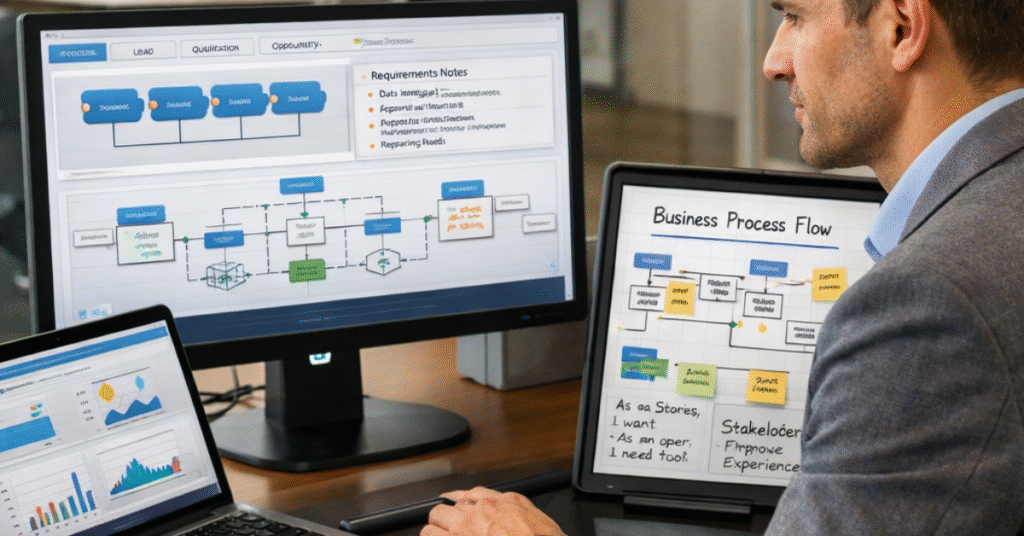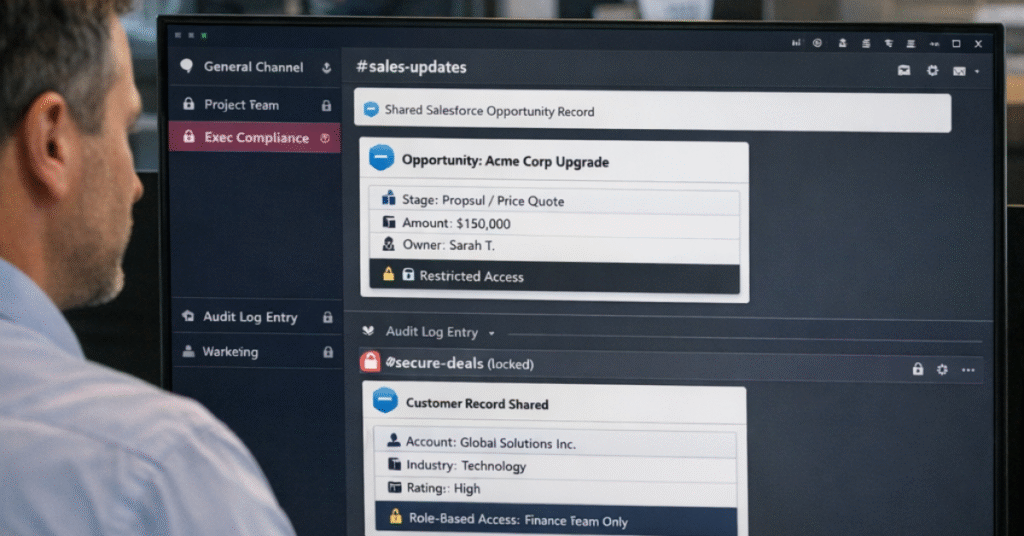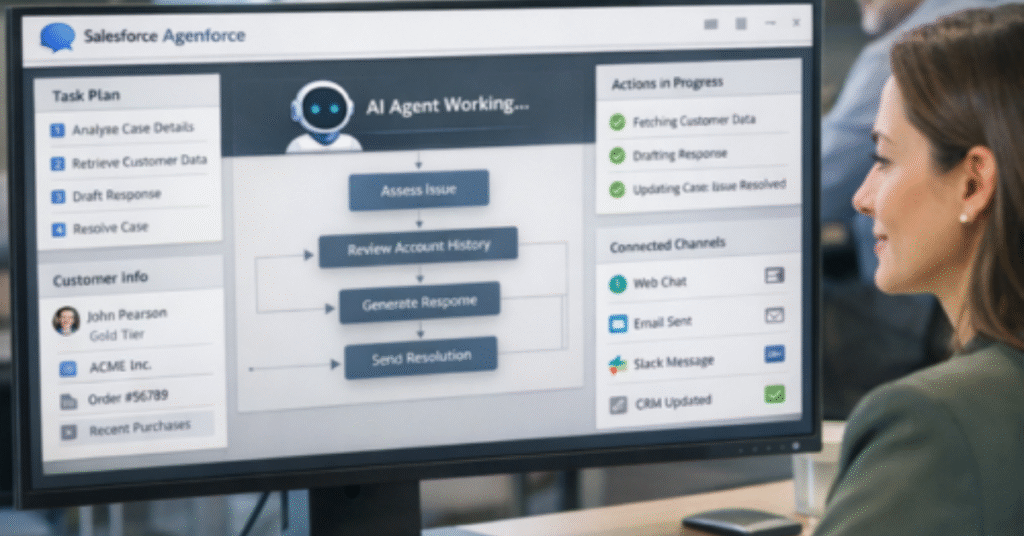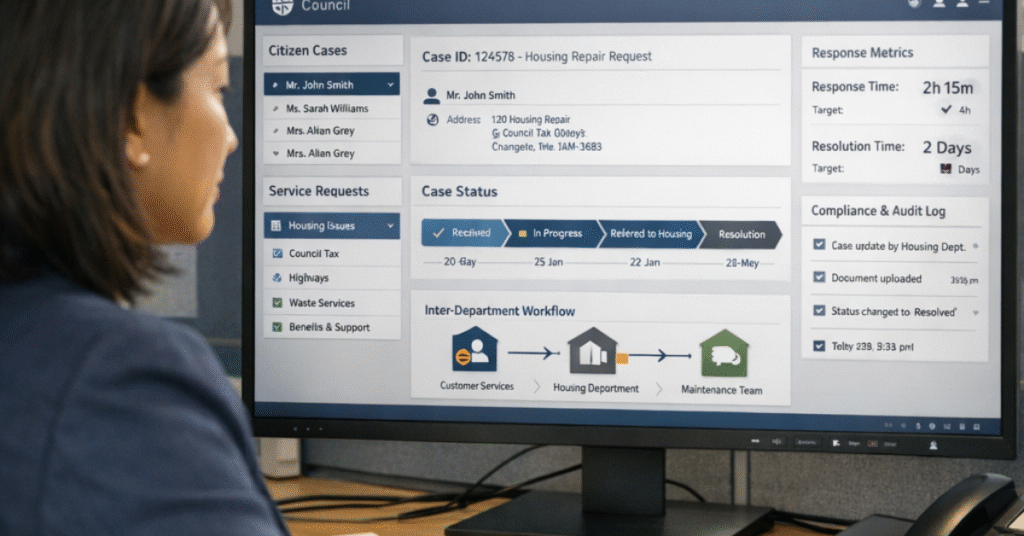
Did you know that businesses using Salesforce CRM see an average 41% increase in sales productivity? In today’s competitive landscape, managing customer relationships effectively isn’t just an advantage it’s essential for survival. Whether you’re a growing startup or an established enterprise, understanding the comprehensive Salesforce CRM features and benefits can be the key to unlocking unprecedented business growth.
As the world’s leading customer relationship management platform, Salesforce CRM has revolutionised how businesses connect with customers, streamline operations, and drive revenue. But with its vast array of features and capabilities, knowing where to start can feel overwhelming.
Salesforce has earned its position as the number one CRM globally by consistently delivering innovative Salesforce services that adapt to evolving business needs. The platform serves over 150,000 companies worldwide, from small businesses to Fortune 500 enterprises, each benefiting from its robust ecosystem of tools and integrations.
The beauty of Salesforce CRM lies in its ability to centralise all customer interactions, data, and processes in one unified platform. This consolidation eliminates the frustration of juggling multiple systems whilst providing teams with the insights they need to make informed decisions.
Sales Cloud forms the foundation of Salesforce CRM features and benefits, offering comprehensive tools to manage your entire sales process. The platform provides lead management capabilities that automatically capture and score prospects, ensuring your sales team focuses on the most promising opportunities.
Opportunity management features allow sales representatives to track deals through customisable pipelines, providing clear visibility into revenue forecasts. The integrated quote and proposal generation tools streamline the closing process, whilst automated follow-up sequences ensure no prospect falls through the cracks.
The forecasting capabilities within Sales Cloud use artificial intelligence to predict sales outcomes with remarkable accuracy, helping leadership make strategic decisions based on real-time data rather than guesswork.
Customer service excellence becomes achievable through Service Cloud’s comprehensive support features. The platform offers omnichannel support, allowing customers to reach your team through phone, email, chat, social media, or self-service portals seamlessly.
Case management functionality automatically routes customer enquiries to appropriate team members, whilst knowledge bases provide instant access to solutions. The platform’s AI-powered Einstein technology can even suggest responses and escalation paths, dramatically reducing resolution times.
Analytics and reporting features track key performance indicators such as first-call resolution rates and customer satisfaction scores, enabling continuous improvement in service delivery.
Modern marketing requires personalisation at scale, and Marketing Cloud delivers precisely that capability. The platform enables sophisticated email marketing campaigns with dynamic content that adapts to each recipient’s preferences and behaviour.
Social media management tools allow businesses to monitor brand mentions, engage with customers, and measure campaign effectiveness across multiple platforms. With Salesforce Marketing Cloud Services, the journey builder feature creates automated, personalised customer experiences that nurture leads through the sales funnel.
Advanced segmentation capabilities ensure the right message reaches the right audience at the optimal time, maximising campaign effectiveness whilst minimising marketing spend.
The most immediate benefit businesses experience with Salesforce CRM is improved sales performance. The platform’s lead scoring algorithms help sales teams prioritise high-value prospects, whilst automated workflows eliminate administrative tasks that traditionally consume valuable selling time.
Pipeline visibility features provide managers with real-time insights into team performance, enabling proactive coaching and support. The result is typically a 25-30% increase in sales productivity within the first year of implementation.
Revenue forecasting becomes significantly more accurate, allowing businesses to make confident decisions about hiring, inventory, and expansion plans. The platform’s AI capabilities continuously learn from historical data, improving prediction accuracy over time.
Salesforce CRM features and benefits extend far beyond sales metrics, fundamentally transforming how businesses interact with customers. The platform creates a complete 360-degree view of each customer, including purchase history, support interactions, and communication preferences.
This comprehensive understanding enables personalised interactions that build stronger relationships. Customer service teams can resolve issues more efficiently by accessing complete interaction histories, whilst sales teams can tailor their approach based on past engagements.
The result is typically a 20-25% improvement in customer retention rates, as customers feel understood and valued throughout their journey with your business.
One of the most significant Salesforce CRM advantages is operational efficiency. The platform eliminates data silos by centralising all customer-related information, reducing time spent searching for information across multiple systems.
Automated workflows handle routine tasks such as lead assignment, follow-up reminders, and report generation, freeing your team to focus on high-value activities. Custom dashboards provide real-time insights into key performance indicators, enabling quick identification of trends and issues.
Integration capabilities connect Salesforce with existing business systems, creating a unified technology ecosystem that supports rather than hinders productivity.
The Analytics Cloud component of Salesforce CRM transforms raw data into actionable insights through interactive dashboards and customisable reports. Real-time data visualisation helps identify trends, opportunities, and potential issues before they impact business performance.
Predictive analytics capabilities use machine learning to forecast customer behaviour, sales outcomes, and market trends. This forward-looking intelligence enables proactive rather than reactive business strategies.
Custom report builders allow teams to create specific views of their data without requiring technical expertise, democratising access to business intelligence across the organisation.
Comprehensive performance tracking features monitor every aspect of customer engagement, from initial lead capture through post-sale support. This visibility enables continuous optimisation of processes and strategies.
A/B testing capabilities allow businesses to experiment with different approaches to messaging, pricing, and service delivery, using data to guide decision-making rather than intuition.
ROI tracking features demonstrate the direct impact of marketing campaigns, sales activities, and service improvements on business outcomes, justifying investment in customer relationship management.
Modern businesses rely on multiple software solutions, and Salesforce CRM excels at connecting these disparate systems. The platform offers pre-built integrations with popular accounting software, marketing tools, and business applications.
API capabilities enable custom integrations with proprietary systems, ensuring Salesforce can adapt to unique business requirements rather than forcing businesses to change their processes.
Data synchronisation features ensure information remains consistent across all connected systems, eliminating the errors and inefficiencies associated with manual data entry.
The flexibility of Salesforce CRM features and benefits allows adaptation to virtually any industry or business model. Custom fields, objects, and workflows can be configured to match specific business processes without requiring extensive development work.
Industry-specific solutions are available for healthcare, financial services, manufacturing, and retail, providing pre-configured features that address sector-specific challenges and compliance requirements.
The platform’s scalability ensures it can grow with your business, accommodating increased users, data volumes, and complexity without performance degradation.
The cloud-based nature of Salesforce CRM ensures your team can access critical customer information from anywhere with an internet connection. Mobile applications provide full functionality on smartphones and tablets, enabling productivity regardless of location.
Offline capabilities allow continued work even without internet connectivity, with automatic synchronisation once connection is restored. This reliability is crucial for field sales teams and remote workers.
Real-time collaboration features enable team members to share information, update records, and communicate effectively, regardless of their physical location.
Enterprise-grade security features protect sensitive customer data through encryption, access controls, and audit trails. Regular security updates and compliance certifications ensure the platform meets the highest industry standards.
Data backup and disaster recovery capabilities provide peace of mind, knowing that critical business information is protected against loss or corruption.
Compliance features help businesses meet regulatory requirements such as GDPR, HIPAA, and industry-specific standards, reducing legal risks and building customer trust.
Successfully implementing Salesforce CRM requires more than simply purchasing licenses and hoping for the best. The platform’s extensive capabilities need careful configuration and customisation to align with your specific business processes and objectives.
Professional implementation services ensure your Salesforce instance is configured correctly from the start, avoiding common pitfalls that can hinder adoption and effectiveness. Proper data migration ensures historical customer information is preserved and accessible within the new system.
Training and change management support help your team embrace the new platform, maximising the return on your CRM investment. Ongoing support and optimisation services ensure your Salesforce implementation continues delivering value as your business evolves.
The comprehensive Salesforce CRM features and benefits outlined above represent just a fraction of what’s possible with the world’s leading customer relationship management platform. From enhanced sales performance and improved customer relationships to streamlined operations and powerful analytics, Salesforce provides the foundation for sustainable business growth.
However, realising these benefits requires expert implementation and ongoing optimisation. The complexity of modern business processes demands a tailored approach that aligns Salesforce capabilities with your unique requirements and objectives.
Ready to discover how Salesforce CRM can transform your business? Contact Sailwayz today to explore customised Salesforce solutions designed specifically for your organisation’s needs. Our certified consultants provide expert guidance throughout the implementation process, ensuring you maximise the return on your CRM investment whilst achieving your growth objectives.
Q:1 What are the main benefits of using Salesforce CRM for small businesses?
Small businesses benefit from improved sales organisation, automated follow-ups, better customer insights, and scalable growth capabilities that adapt as the business expands without requiring system changes.
Q:2 How long does it typically take to implement Salesforce CRM?
Implementation timeframes vary from 2-8 weeks for basic setups to several months for complex, customised deployments, depending on data migration requirements, integrations, and customisation needs.
Q:3 Can Salesforce CRM integrate with existing business software?
Yes, Salesforce offers extensive integration capabilities with accounting software, marketing tools, e-commerce platforms, and custom applications through APIs and pre-built connectors.
Q:4 What training is required for teams to use Salesforce effectively?
Basic user training typically requires 4-8 hours, whilst administrator training may need 20-40 hours. Ongoing training ensures teams leverage new features and maintain best practices.
Q:5 How does Salesforce CRM pricing work for UK businesses?
Salesforce offers various pricing tiers starting from £20 per user per month, with costs varying based on features required, user count, and additional cloud solutions needed.











Joshua Eze is the Founder & Salesforce Architect at Sailwayz, a certified Salesforce Consulting Partner based in the UK. With over 6 years of experience leading CRM transformations, he is a certified Application & System Architect passionate about using technology to simplify business processes. Joshua helps companies unlock the full potential of Salesforce with strategic, scalable, and secure solutions.